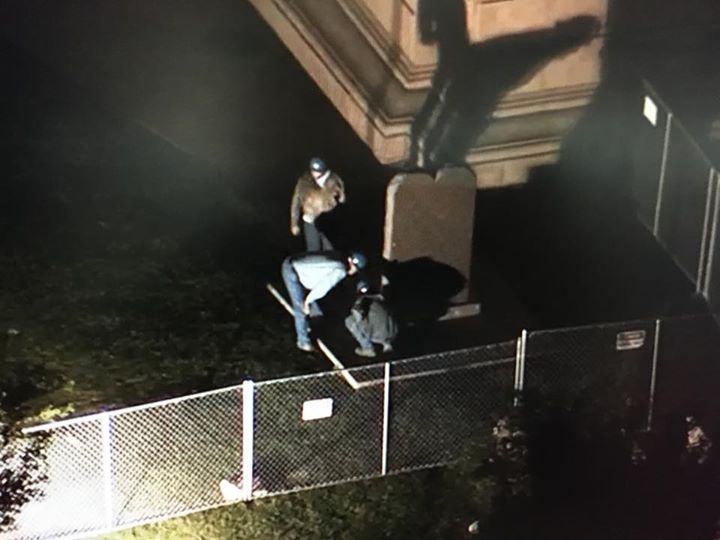Construction crews needed special lighting as they removed a Ten Commandments monument from the Oklahoma capitol grounds in the dark of night Monday.

“We wanted it to be done as quickly and efficiently as possible, and doing it at night gave us the best opportunity to do that,” Office of Management and Enterprise Services spokesman John Estus tells KOCO. “The Highway Patrol was also very concerned that having it in the middle of the day could lead to having demonstrations of some kind.”
The Oklahoma Supreme Court ordered the privately-financed monument removed after ruling in June “that the monument’s display violated a constitutional prohibition on the use of public property to support a ‘system of religion,'” News 9 reports.
Oklahoma Gov. Mary Fallin had previously defied the Supreme Court’s order, saying she would keep the monument in place while an appeal was heard.
“The Ten Commandments monument was built to recognize and honor the historical significance of the Commandments in our state’s and nation’s systems of laws,” Fallin said at the time.
“The monument was built and maintained with private dollars. It is virtually identical to a monument on the grounds of the Texas State Capitol which the United States Supreme Court ruled to be permissible. It is a privately funded tribute to historical events, not a taxpayer funded endorsement of any religion, as some have alleged.”
In a 7-2 ruling, the Supreme Court sided with the ACLU and its three plaintiffs. The group immediately denounced Fallin’s decision.
“The Supreme Court did not give any leeway in their opinion. The bipartisan, seven-member majority did not say remove the monument except if you look into your crystal ball and think the law might allow it at some point in the future and go ahead and keep it,” ACLU of Oklahoma executive director Ryan Kiesel told the Tulsa World. “The court said remove the monument.”
Kiesel believed Fallin was in “contempt” of the court’s ruling.
“Frankly, I would be astonished if we get to a point where the governor outright defies an order of our state’s highest court,” he said. “That said, if she does, there is a word for it. It is called contempt.”
The monument is being relocated to the Oklahoma Council for Public Affairs’ offices.
Leave a Comment
COMMENTS POLICY: We have no tolerance for messages of violence, racism, vulgarity, obscenity or other such discourteous behavior. Thank you for contributing to a respectful and useful online dialogue.